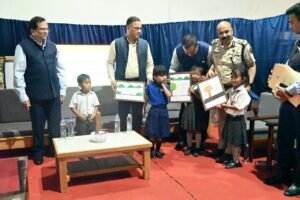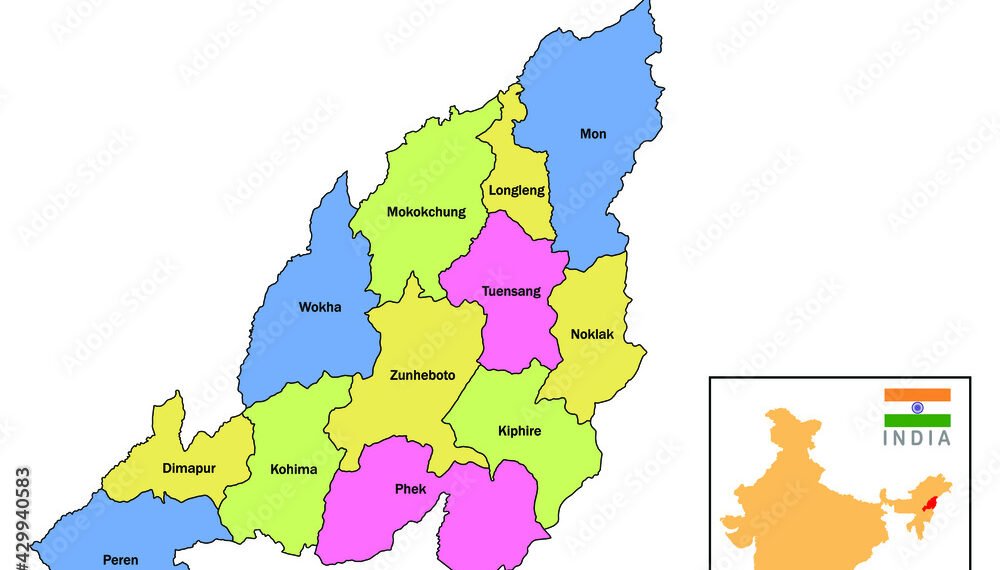Four tribal bodies challenged the enumeration order, arguing it is discriminatory and questions their constitutionally recognized Scheduled Tribe status in Nagaland, leading to the initial stay on May 12, 2025.
BY PC Bureau
The Kohima Bench of the Gauhati High Court has extended its stay on the proposed enumeration exercise aimed at verifying the ancestry of the Garo, Kuki, Kachari, and Mikir (Karbi) communities settled in Nagaland prior to December 1, 1963.
On June 2, 2025, Justice Kakheto Sema noted that Imti Imsong, the learned Additional Advocate General, requested three weeks’ time to file an affidavit-in-opposition. Consequently, the Judge granted the extension.
BEFORE
HON’BLE MR. JUSTICE KAKHETO SEMA
ORDER
Date: 02-06-2025Mr. Imti Imsong, learned Addl. Advocate General seeks for and is granted 3 (three) weeks’ time to file affidavit-in-opposition. List it accordingly. Interim order passed earlier shall continue till the next returnable date.
Sd/
JUDGE
This order effectively maintains the status quo, ensuring that no action is taken under the controversial enumeration process until the matter returns for hearing.
The initial stay was issued on May 12, 2025, in response to a writ petition (WP(C)/72/2025) jointly filed by four prominent tribal bodies: the Kuki Inpi Nagaland, the Nagaland Garo Tribal Council, the Kachari Tribal Council Nagaland, and the Karbi Union Nagaland. Justice Yarenjungla Longkumer passed this interim order after hearing the arguments of the petitioners’ counsel, A. Zhimomi and his team, and the Additional Advocate General representing the State.
 MUST READ: Home Secy Mohan Reviews Relief Camps in Churachandpur, Provides Healing Touch
MUST READ: Home Secy Mohan Reviews Relief Camps in Churachandpur, Provides Healing Touch
Background and Petitioners’ Arguments:
The petitioners are challenging the Nagaland government’s Home Department order dated September 20, 2024, which was issued following a Cabinet decision on September 12, 2024. This order mandated the enumeration of individuals belonging to the Garo, Kuki, Kachari, and Mikir (Karbi) communities to determine their eligibility for Indigenous Inhabitant Certificates (IIC) and Permanent Resident Certificates (PRC). A subsequent notification dated October 1, 2024, outlined the timeline for this verification exercise, which was scheduled to commence on November 1, 2024, and conclude with a final list by May 6, 2025, although it reportedly did not begin.
The core argument of the petitioners is that they are constitutionally recognized as Scheduled Tribes of Nagaland under the Scheduled Tribes Order, 1970, and therefore are entitled to equal treatment with all other recognized tribal communities within the state. They assert that the proposed enumeration exercise is discriminatory in its premise and lacks a valid legal foundation.
“The state has no jurisdiction to question the tribal status of communities already notified as Scheduled Tribes of Nagaland,” the petitioners argued. They further contended that this targeted verification process undermines their constitutionally guaranteed status and violates the fundamental principles of equality and non-discrimination.
Court’s Directive:
Acknowledging the gravity of the matter, the Court directed that the state government must refrain from taking any action concerning the enumeration process until the next hearing. The Court also granted permission to the state respondents to file their counter-affidavits and instructed the petitioners to provide the necessary copies of their submissions to the Additional Advocate General.
 READ: Adani Risks U.S. Asset Seizure, Sanction Amid Iran Oil Import Probe
READ: Adani Risks U.S. Asset Seizure, Sanction Amid Iran Oil Import Probe
The case is scheduled for further hearing in three weeks, at which time the prayer for an interim stay will be considered in greater detail. The current stay order effectively halts all proceedings related to the controversial enumeration drive, preventing any steps towards identifying individuals’ eligibility for IIC/PRC based on their ancestry within the four named communities. The petitioners have sought the quashing of the government orders they deem unlawful, expressing concerns that this move could lead to arbitrary exclusion or denial of their indigenous status.
This legal challenge is anticipated to have significant broader implications for policies concerning indigeneity, tribal rights, and residency verification across Nagaland, a state characterized by its intricate ethnic landscape and a history marked by sensitive identity politics.
READ: Mufti meets LG, Lays Out Vision for Kashmiri Pandits Return
Operative Part of the May 12, 2025 ORDER:
- Learned Additional Advocate General, Mr. Imti Imsong has accepted notice on behalf of all the State respondents. Accordingly, no formal notice is called for at this stage. The petitioner has also prayed for an Interim order staying the operation of order dated 20.09.2024 and notification dated 01.10.2024 pending disposal of this Writ Petition.
- List the matter after 3 (three) weeks, as prayed for by the learned Additional Advocate General, on which date the prayer for the Interim order shall be considered. The petitioner shall supply requisite copies of the petition to the Additional Advocate general.
- The respondents are also at liberty to file their affidavit-in-opposition, if so advised.
- Till the next date the respondent shall not take any exercise with regard to the enumeration. Certified to be true Copy Assistant Registrar (Ju L) Guahati High Court Kohima Bench Authorised under 576ACT 1 of 1872.














